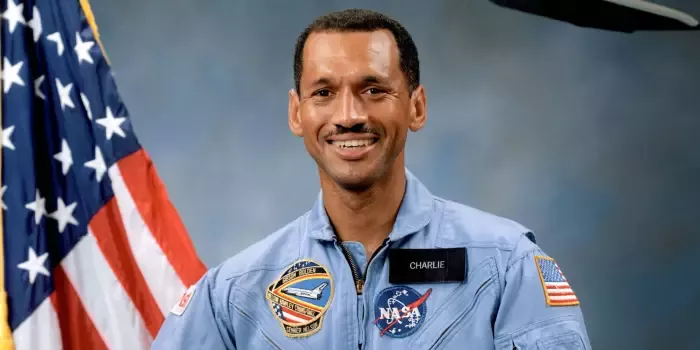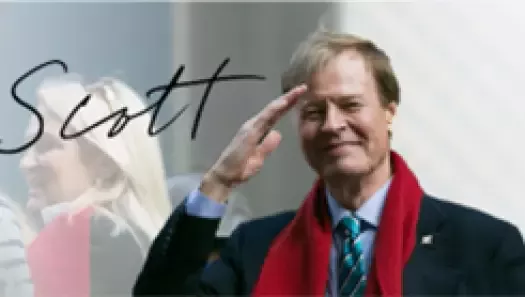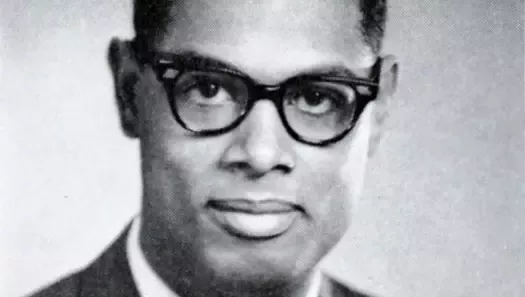WeSalute Awards
HeroVet: Major General Charles F. Bolden, Jr. USMC, Ret., NASA Administrator

For decades, the best-known Marine Corps Astronaut-turned public servant was Senator John Glenn, the first American to orbit the earth. In 2009, nearly 50 years into America's Space Age, once again a Marine claimed a special place in space history and public administration, as Major General Charles F. Bolden, Jr, USMC, Ret. became the first African-American and the second former astronaut to lead NASA.
A long-time alumnus of the Space Agency, Bolden's 34-year career with the Marine Corps included 14 years as a NASA astronaut. With his Marine Corps background, plus his experience as an astronaut, he has proved to be uniquely equipped to lead NASA in the 21st Century. At NASA, Bolden has overseen the transition from 30 years of space shuttle missions, to a focus on the International Space Station, and a dedication to space and aeronautics technology development.
Many hope this transition period will lead to the development of a Space Launch System rocket and Orion spacecraft that will carry astronauts to deep space destinations, such as an asteroid and Mars. Reaching these milestones will come from the years of hard work by NASA with its ongoing unmanned reconnaissance missions to the red planet. And for Bolden, his NASA role is another opportunity to inspire children with his pioneering vision of the future.
"Our governments need to invest more in the exploration of our universe. I won't do it, but I'd like to pave the way for my granddaughters to set foot on Mars. There's evidence Mars may sustain life today and we need to see that," Bolden said in 2006, before he became NASA Administrator, a vision he is pursuing today.
The news of President Obama's 2009 nomination of Bolden was made on the completion of the final Atlantis shuttle mission to Hubble in late May. At the time, Mission Control radioed the news of the Bolden nomination to Atlantis commander Scott Altman, so he could alert his crew. Altman and his crew then spoke with President Obama during a private call between Washington and the Shuttle Flight Deck.
"I can assure you that it's a high priority of mine to restore that sense of wonder that space can provide and to make sure that we've got a strong sense of mission, not just within NASA but for the country as a whole," Obama told the Shuttle crew.
Bolden, 67, was easily confirmed by the Senate, where he had several supporters, including Florida Senator Bill Nelson. Fifteen years earlier, in January 1986, the Senator had flown as a guest on Bolden's very first space shuttle mission--just two weeks before the deadly Challenger accident.
MILITARY & SPACE SERVICE
Ironically, from Bolden's beginnings, one could not predict his strong ascent into an aviation career. As a youngster growing up in Columbia, S.C., in the 1950s and '60s, Bolden had never traveled farther than Charlotte, N.C., or Charleston, S.C.
"Going to space, flying airplanes -- not in the cards, not for me," is what Bolden thought as an African-American youth. "I knew astronauts, and they were all white, Anglo-Saxon Protestants about 5-foot-10, and they were all military test pilots at that time. So that was not in the cards for me. I didn't fool myself -- there was no way in the world I was going to do that."
He first thought flying airplanes was too risky, but ended up attending flight school and falling in love with flying. Bolden has logged more than 6,000 hours of flying time, among them more than 100 sorties in Vietnam and the 1991 Gulf War, and his many military decorations include the Distinguished Flying Cross.
Starting with NASA's astronaut corps in 1981, he served on four space shuttle missions -- two as a crew member, and two as mission commander -- and logging over 680 hours in earth orbit. Bolden stayed with NASA during its painful recovery following the 1986 Challenger explosion. In another historic event, he was a pilot for the 1990 mission that launched the Hubble Telescope that, after initial difficulties, brought over two decades of fantastic pictures and valuable scientific research back to earth. He also commanded a 1992 shuttle atmospheric research flight and, in 1994, led a mission that included the first Russian cosmonaut as a member of a shuttle crew. The astronaut/cosmonaut exchange program culminated in a partnership to operate the International Space Station, which continues today.
Bolden left NASA in 1994 to resume his career in the Marine Corps and was appointed deputy commandant of the United States Naval Academy. In 1997, he was assigned as the Deputy Commanding General of the 1st Marine Expeditionary Force in the Pacific. During the Persian Gulf War, in first half of 1998, he served as Commanding General of the 1st Marine Expeditionary Force Forward in support of Operation Desert Thunder in Kuwait.
Bolden was promoted to major general in July 1998 and named Deputy Commander of U.S. Forces in Japan. Before his retirement, he returned stateside to San Diego, and from 2000 until 2002, served as the Commanding General of the 3rd Marine Aircraft Wing at Marine Corps Air Station Miramar. In 2002, President George W. Bush made an attempt to appoint Bolden as NASA's deputy administrator, however Pentagon forces, said to be relying on his continued military leadership, blocked his nomination.
Bolden retired from the Marine Corps in 2003. He holds a B.S. in electrical science from the United States Naval Academy, and a masters in systems management from the University of Southern California. He was inducted into the U.S. Astronaut Hall of Fame in May 2006.
ASTRONAUT ROLE MODEL & HERO TO KIDS
Prior to becoming NASA Administrator, Bolden served on the board of the Military Child Education Coalition. The mission of the Coalition is to ensure inclusive, quality educational experiences for all military-connected children affected by mobility, family separation, and transition at: http://www.militarychild.org
Bolden has advocated to make the needs of military kids a priority, reminding educators and the public of the unique challenges faced by this special group. Among the many fears military kids have are fears about their parents' safety and fears about their multiple adjustments in new school environments.
"[Military] Children need to be taught that they can do things to help the other kids around them without being fearful," Bolden says. "We need to dare them to achieve," he added. "We have an obligation to the kids with whom we work to help them understand that heritage, to help them understand the obligation to dare to achieve."
Last August, NASA Administrator Bolden introduced his 2013 Class of NASA Astronauts—four men and four women selected from a candidate pool of over 6,000—as they arrived at the agency's Johnson Space Center in Houston, Texas to begin two years of basic training. His proud announcement of the new class reflects in many ways Bolden's own achievements:
"The new astronauts we're introducing today are critical to achieving our ambitious goals," added Bolden. "They will help us continue to lead the world in exploration and they'll become role models for boys and girls, men and women, from all over the world. Their journey begins now, and the nation, as it always has, will be right beside them reaching for the stars."
Image Credit: http://www.huffingtonpost.com/author/charles-f-bolden-jr



